IT Ethics: Development Methodology Scenario 2 & ACS Code
VerifiedAdded on 2023/05/29
|7
|1321
|364
Report
AI Summary
This report evaluates 'Scenario 2: Development Methodology' to understand the ethical issues, focusing on a junior developer's interaction with a client and deviations from the agreed software changes and deadlines. The analysis is based on the principles of the ACS Code of Professional Conduct, highlighting breaches in public interest, quality of life enhancement, honesty, competence, professional development, and professionalism. The report recommends adhering to organizational hierarchy and ethical theories like Utilitarianism and Deontology to avoid unethical actions. The conclusion emphasizes the importance of complying with ethical guidelines to ensure professional duties are discharged responsibly, ultimately suggesting that IT professionals must carefully evaluate their responsibilities to prevent unethical behavior. Desklib provides access to this and other solved assignments to aid students in their studies.
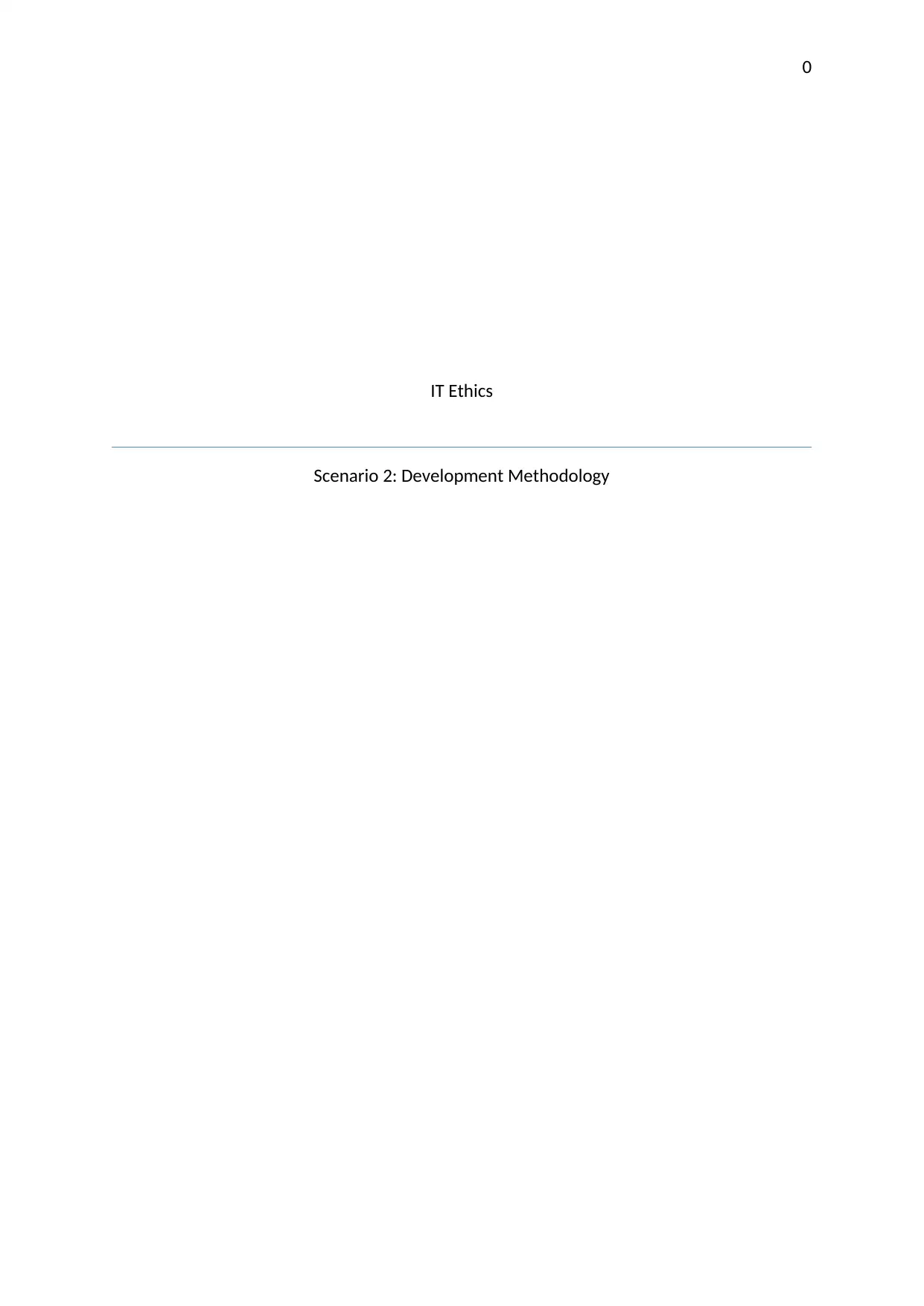
0
IT Ethics
Scenario 2: Development Methodology
IT Ethics
Scenario 2: Development Methodology
Paraphrase This Document
Need a fresh take? Get an instant paraphrase of this document with our AI Paraphraser
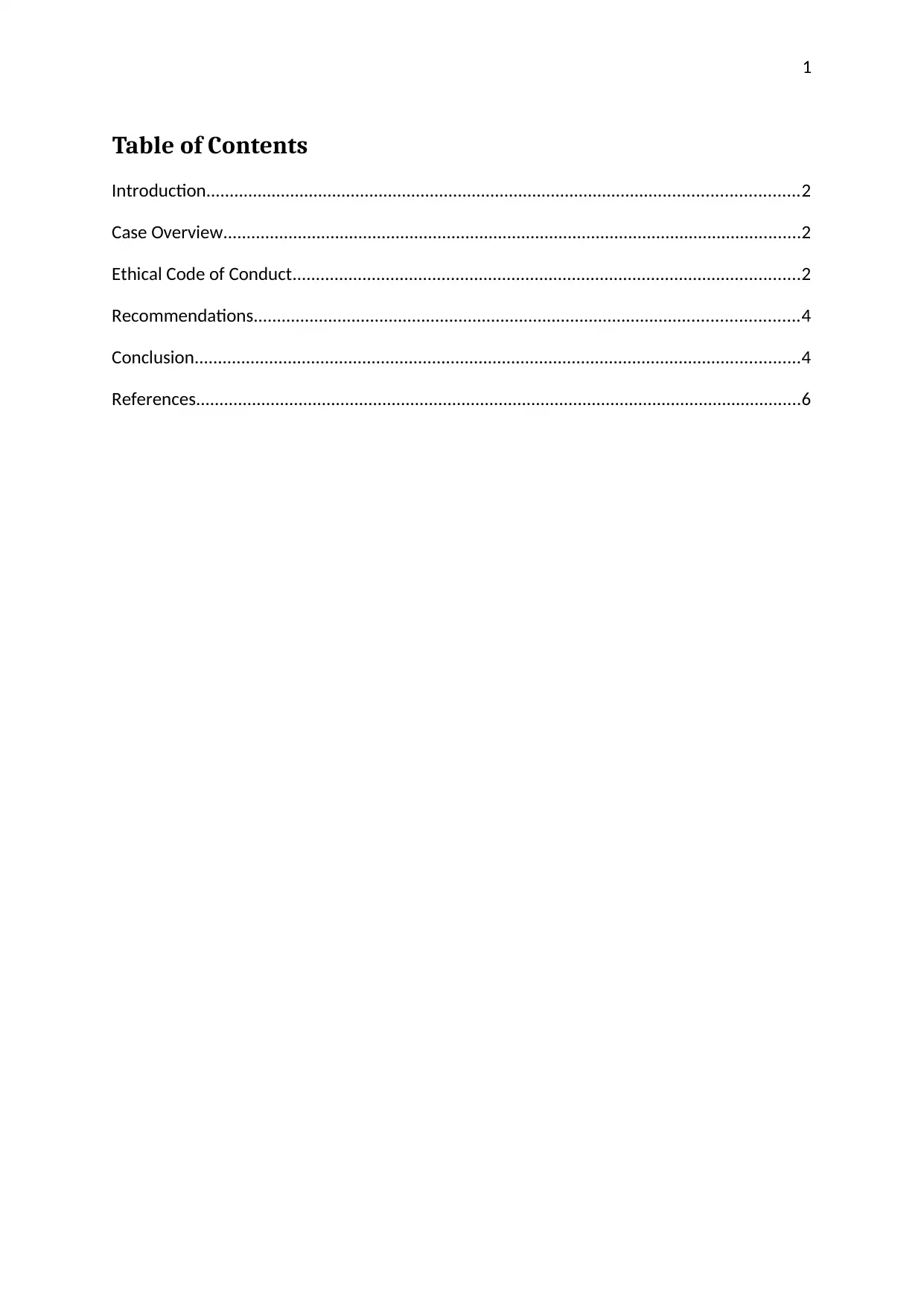
1
Table of Contents
Introduction...............................................................................................................................2
Case Overview............................................................................................................................2
Ethical Code of Conduct.............................................................................................................2
Recommendations.....................................................................................................................4
Conclusion..................................................................................................................................4
References..................................................................................................................................6
Table of Contents
Introduction...............................................................................................................................2
Case Overview............................................................................................................................2
Ethical Code of Conduct.............................................................................................................2
Recommendations.....................................................................................................................4
Conclusion..................................................................................................................................4
References..................................................................................................................................6
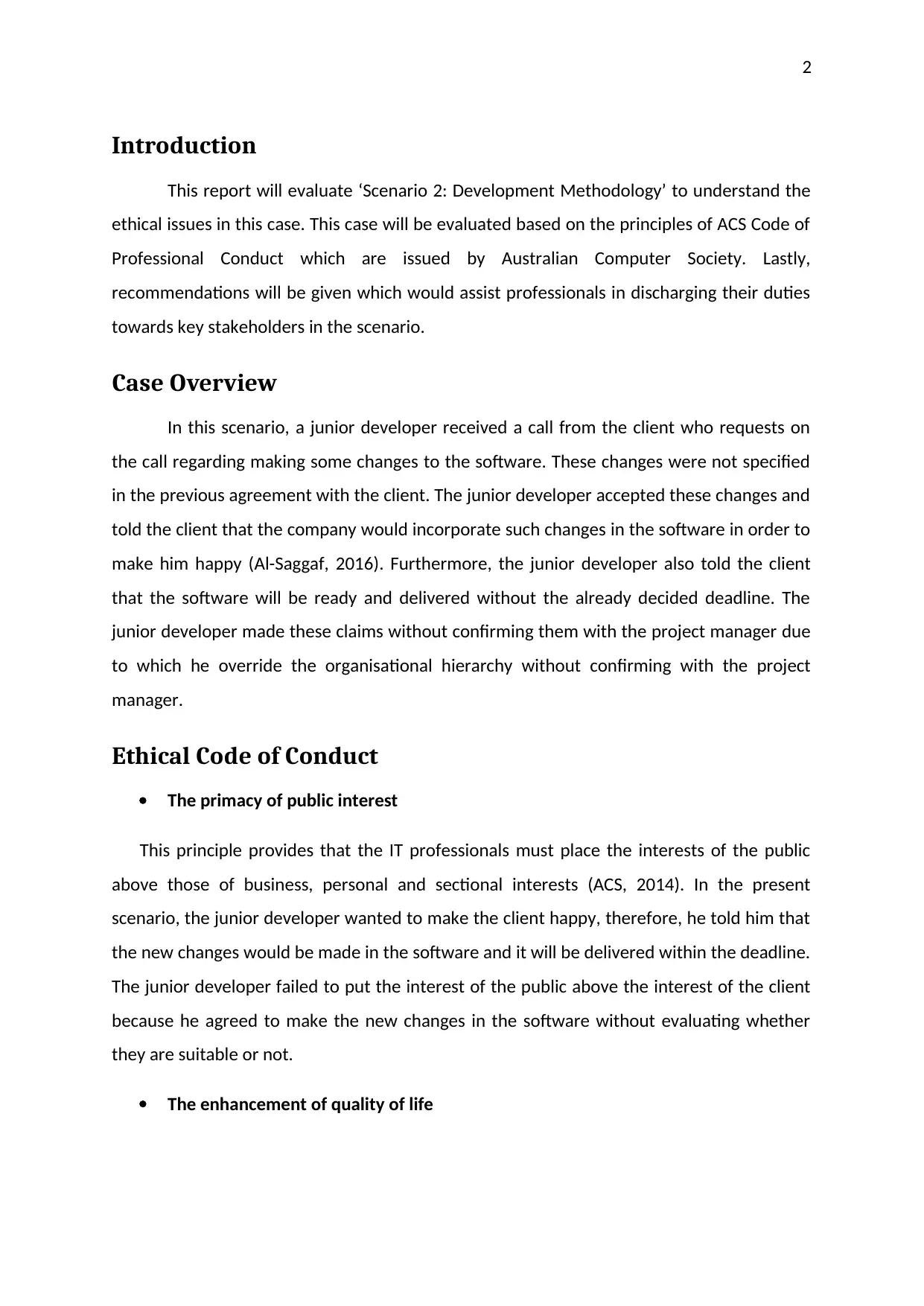
2
Introduction
This report will evaluate ‘Scenario 2: Development Methodology’ to understand the
ethical issues in this case. This case will be evaluated based on the principles of ACS Code of
Professional Conduct which are issued by Australian Computer Society. Lastly,
recommendations will be given which would assist professionals in discharging their duties
towards key stakeholders in the scenario.
Case Overview
In this scenario, a junior developer received a call from the client who requests on
the call regarding making some changes to the software. These changes were not specified
in the previous agreement with the client. The junior developer accepted these changes and
told the client that the company would incorporate such changes in the software in order to
make him happy (Al-Saggaf, 2016). Furthermore, the junior developer also told the client
that the software will be ready and delivered without the already decided deadline. The
junior developer made these claims without confirming them with the project manager due
to which he override the organisational hierarchy without confirming with the project
manager.
Ethical Code of Conduct
The primacy of public interest
This principle provides that the IT professionals must place the interests of the public
above those of business, personal and sectional interests (ACS, 2014). In the present
scenario, the junior developer wanted to make the client happy, therefore, he told him that
the new changes would be made in the software and it will be delivered within the deadline.
The junior developer failed to put the interest of the public above the interest of the client
because he agreed to make the new changes in the software without evaluating whether
they are suitable or not.
The enhancement of quality of life
Introduction
This report will evaluate ‘Scenario 2: Development Methodology’ to understand the
ethical issues in this case. This case will be evaluated based on the principles of ACS Code of
Professional Conduct which are issued by Australian Computer Society. Lastly,
recommendations will be given which would assist professionals in discharging their duties
towards key stakeholders in the scenario.
Case Overview
In this scenario, a junior developer received a call from the client who requests on
the call regarding making some changes to the software. These changes were not specified
in the previous agreement with the client. The junior developer accepted these changes and
told the client that the company would incorporate such changes in the software in order to
make him happy (Al-Saggaf, 2016). Furthermore, the junior developer also told the client
that the software will be ready and delivered without the already decided deadline. The
junior developer made these claims without confirming them with the project manager due
to which he override the organisational hierarchy without confirming with the project
manager.
Ethical Code of Conduct
The primacy of public interest
This principle provides that the IT professionals must place the interests of the public
above those of business, personal and sectional interests (ACS, 2014). In the present
scenario, the junior developer wanted to make the client happy, therefore, he told him that
the new changes would be made in the software and it will be delivered within the deadline.
The junior developer failed to put the interest of the public above the interest of the client
because he agreed to make the new changes in the software without evaluating whether
they are suitable or not.
The enhancement of quality of life
⊘ This is a preview!⊘
Do you want full access?
Subscribe today to unlock all pages.

Trusted by 1+ million students worldwide
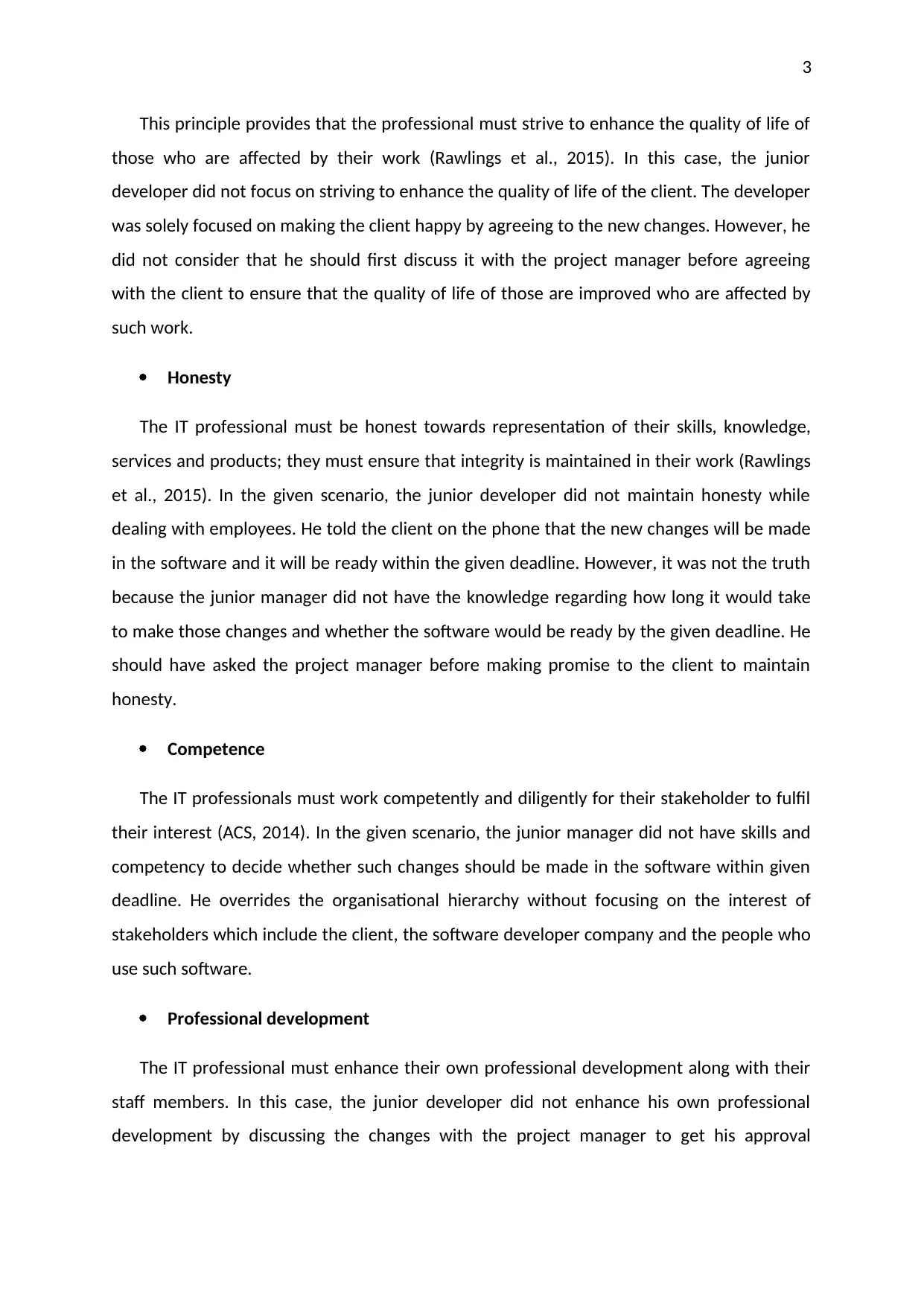
3
This principle provides that the professional must strive to enhance the quality of life of
those who are affected by their work (Rawlings et al., 2015). In this case, the junior
developer did not focus on striving to enhance the quality of life of the client. The developer
was solely focused on making the client happy by agreeing to the new changes. However, he
did not consider that he should first discuss it with the project manager before agreeing
with the client to ensure that the quality of life of those are improved who are affected by
such work.
Honesty
The IT professional must be honest towards representation of their skills, knowledge,
services and products; they must ensure that integrity is maintained in their work (Rawlings
et al., 2015). In the given scenario, the junior developer did not maintain honesty while
dealing with employees. He told the client on the phone that the new changes will be made
in the software and it will be ready within the given deadline. However, it was not the truth
because the junior manager did not have the knowledge regarding how long it would take
to make those changes and whether the software would be ready by the given deadline. He
should have asked the project manager before making promise to the client to maintain
honesty.
Competence
The IT professionals must work competently and diligently for their stakeholder to fulfil
their interest (ACS, 2014). In the given scenario, the junior manager did not have skills and
competency to decide whether such changes should be made in the software within given
deadline. He overrides the organisational hierarchy without focusing on the interest of
stakeholders which include the client, the software developer company and the people who
use such software.
Professional development
The IT professional must enhance their own professional development along with their
staff members. In this case, the junior developer did not enhance his own professional
development by discussing the changes with the project manager to get his approval
This principle provides that the professional must strive to enhance the quality of life of
those who are affected by their work (Rawlings et al., 2015). In this case, the junior
developer did not focus on striving to enhance the quality of life of the client. The developer
was solely focused on making the client happy by agreeing to the new changes. However, he
did not consider that he should first discuss it with the project manager before agreeing
with the client to ensure that the quality of life of those are improved who are affected by
such work.
Honesty
The IT professional must be honest towards representation of their skills, knowledge,
services and products; they must ensure that integrity is maintained in their work (Rawlings
et al., 2015). In the given scenario, the junior developer did not maintain honesty while
dealing with employees. He told the client on the phone that the new changes will be made
in the software and it will be ready within the given deadline. However, it was not the truth
because the junior manager did not have the knowledge regarding how long it would take
to make those changes and whether the software would be ready by the given deadline. He
should have asked the project manager before making promise to the client to maintain
honesty.
Competence
The IT professionals must work competently and diligently for their stakeholder to fulfil
their interest (ACS, 2014). In the given scenario, the junior manager did not have skills and
competency to decide whether such changes should be made in the software within given
deadline. He overrides the organisational hierarchy without focusing on the interest of
stakeholders which include the client, the software developer company and the people who
use such software.
Professional development
The IT professional must enhance their own professional development along with their
staff members. In this case, the junior developer did not enhance his own professional
development by discussing the changes with the project manager to get his approval
Paraphrase This Document
Need a fresh take? Get an instant paraphrase of this document with our AI Paraphraser

4
through organisational hierarchy. Therefore, he failed to comply with the principle of
professional development.
Professionalism
The IT professionals must enhance the integrity of the ACS and the respect of its
members for each other (Dilday, Miller, Schmitt, Davis & Davis, 2018). In the given scenario,
the junior developer did not maintain integrity because he promised the client that the
changes would be made in the software within given deadline without discussing those
changes with the project manager. He did not respect the position of the project manager
based on organisational hierarchy, and he directly deals with the client based on which this
principle is violated.
Recommendations
In this case, the junior developer should have followed the organisational hierarchy
and avoid directly dealing with the client. He did not have the authority to make promises to
the client without getting the approval of the project manager. He should have made the
decision based on ethical theories. As per Utilitarianism ethical theory, a decision is ethical if
its consequences achieve greater happiness of a greater number of people (Yazdani &
Murad, 2015). The actions of junior developers were unethical as per this theory because its
consequences negatively affected all the stakeholders involved in the scenario. As per
Deontology ethical theory, consequences of action did not matter, and the person must
comply with his/her duties to act ethically (Kagan, 2018). The junior developer failed to
comply with this theory as well because he breached his duty by promising the client. Thus,
he should have taken the decision based on ethical theories to avoid acting unethical and
unprofessional in the scenario.
Conclusion
In conclusion, the key issue raised in scenario 2 was that the junior developer
overrides organisational hierarchy and directly deal with the client. The junior developer
failed to comply with the principle of ACS code of professional conduct while taking this
decision based on which he breached his professional duties. In order to act ethically and
professionally, the junior developer should have complied with ethical theories such as
through organisational hierarchy. Therefore, he failed to comply with the principle of
professional development.
Professionalism
The IT professionals must enhance the integrity of the ACS and the respect of its
members for each other (Dilday, Miller, Schmitt, Davis & Davis, 2018). In the given scenario,
the junior developer did not maintain integrity because he promised the client that the
changes would be made in the software within given deadline without discussing those
changes with the project manager. He did not respect the position of the project manager
based on organisational hierarchy, and he directly deals with the client based on which this
principle is violated.
Recommendations
In this case, the junior developer should have followed the organisational hierarchy
and avoid directly dealing with the client. He did not have the authority to make promises to
the client without getting the approval of the project manager. He should have made the
decision based on ethical theories. As per Utilitarianism ethical theory, a decision is ethical if
its consequences achieve greater happiness of a greater number of people (Yazdani &
Murad, 2015). The actions of junior developers were unethical as per this theory because its
consequences negatively affected all the stakeholders involved in the scenario. As per
Deontology ethical theory, consequences of action did not matter, and the person must
comply with his/her duties to act ethically (Kagan, 2018). The junior developer failed to
comply with this theory as well because he breached his duty by promising the client. Thus,
he should have taken the decision based on ethical theories to avoid acting unethical and
unprofessional in the scenario.
Conclusion
In conclusion, the key issue raised in scenario 2 was that the junior developer
overrides organisational hierarchy and directly deal with the client. The junior developer
failed to comply with the principle of ACS code of professional conduct while taking this
decision based on which he breached his professional duties. In order to act ethically and
professionally, the junior developer should have complied with ethical theories such as

5
Utilitarianism and Deontology. IT professional should evaluate these responsibilities while
discharging their duties to ensure that they did not act unethically.
Utilitarianism and Deontology. IT professional should evaluate these responsibilities while
discharging their duties to ensure that they did not act unethically.
⊘ This is a preview!⊘
Do you want full access?
Subscribe today to unlock all pages.

Trusted by 1+ million students worldwide
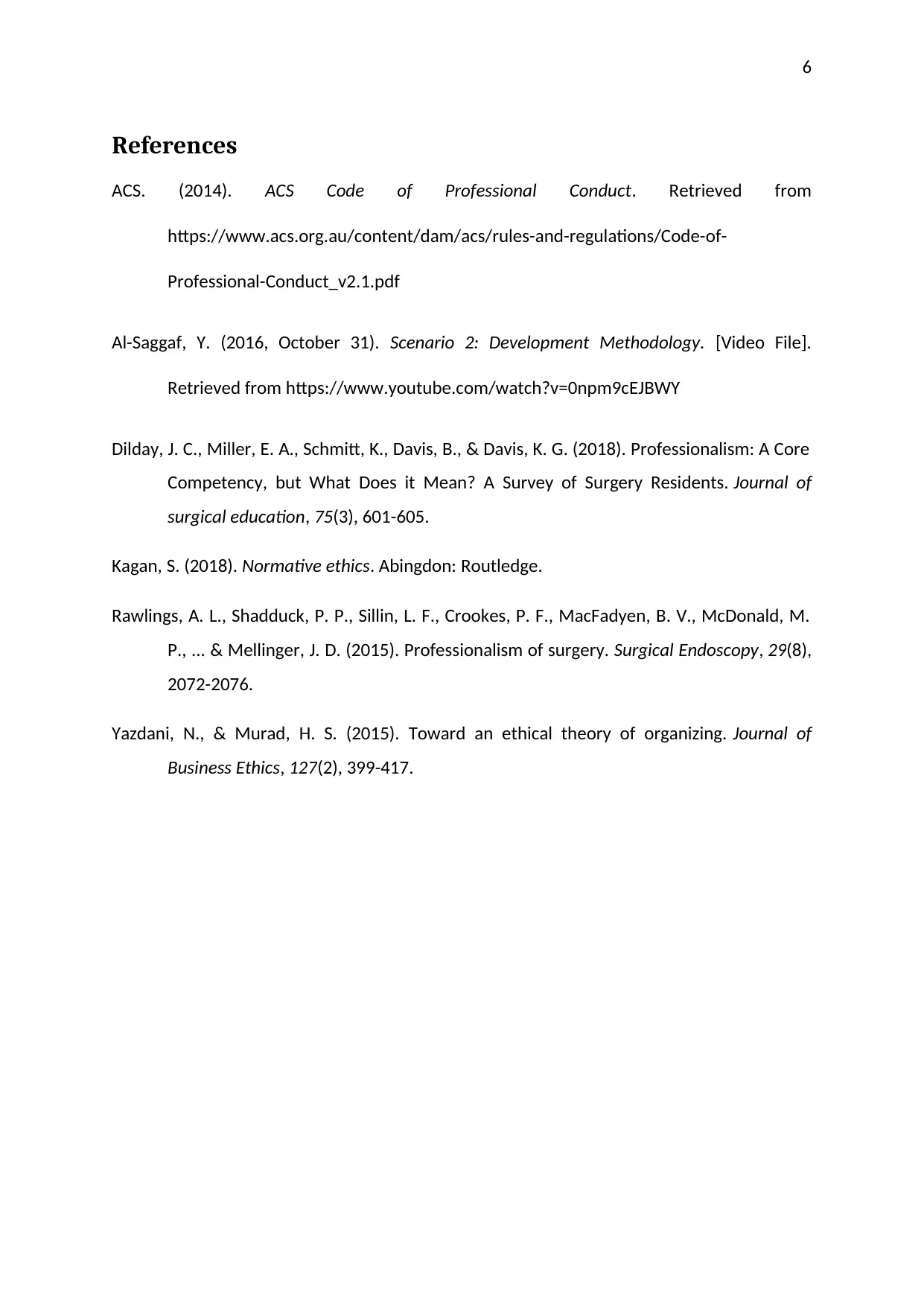
6
References
ACS. (2014). ACS Code of Professional Conduct. Retrieved from
https://www.acs.org.au/content/dam/acs/rules-and-regulations/Code-of-
Professional-Conduct_v2.1.pdf
Al-Saggaf, Y. (2016, October 31). Scenario 2: Development Methodology. [Video File].
Retrieved from https://www.youtube.com/watch?v=0npm9cEJBWY
Dilday, J. C., Miller, E. A., Schmitt, K., Davis, B., & Davis, K. G. (2018). Professionalism: A Core
Competency, but What Does it Mean? A Survey of Surgery Residents. Journal of
surgical education, 75(3), 601-605.
Kagan, S. (2018). Normative ethics. Abingdon: Routledge.
Rawlings, A. L., Shadduck, P. P., Sillin, L. F., Crookes, P. F., MacFadyen, B. V., McDonald, M.
P., ... & Mellinger, J. D. (2015). Professionalism of surgery. Surgical Endoscopy, 29(8),
2072-2076.
Yazdani, N., & Murad, H. S. (2015). Toward an ethical theory of organizing. Journal of
Business Ethics, 127(2), 399-417.
References
ACS. (2014). ACS Code of Professional Conduct. Retrieved from
https://www.acs.org.au/content/dam/acs/rules-and-regulations/Code-of-
Professional-Conduct_v2.1.pdf
Al-Saggaf, Y. (2016, October 31). Scenario 2: Development Methodology. [Video File].
Retrieved from https://www.youtube.com/watch?v=0npm9cEJBWY
Dilday, J. C., Miller, E. A., Schmitt, K., Davis, B., & Davis, K. G. (2018). Professionalism: A Core
Competency, but What Does it Mean? A Survey of Surgery Residents. Journal of
surgical education, 75(3), 601-605.
Kagan, S. (2018). Normative ethics. Abingdon: Routledge.
Rawlings, A. L., Shadduck, P. P., Sillin, L. F., Crookes, P. F., MacFadyen, B. V., McDonald, M.
P., ... & Mellinger, J. D. (2015). Professionalism of surgery. Surgical Endoscopy, 29(8),
2072-2076.
Yazdani, N., & Murad, H. S. (2015). Toward an ethical theory of organizing. Journal of
Business Ethics, 127(2), 399-417.
1 out of 7
Related Documents
Your All-in-One AI-Powered Toolkit for Academic Success.
+13062052269
info@desklib.com
Available 24*7 on WhatsApp / Email
![[object Object]](/_next/static/media/star-bottom.7253800d.svg)
Unlock your academic potential
Copyright © 2020–2026 A2Z Services. All Rights Reserved. Developed and managed by ZUCOL.





